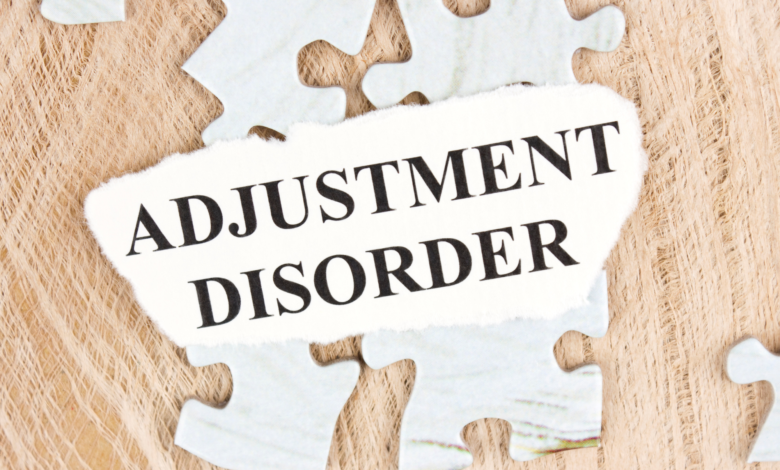Navigating Adjustment Disorder: Tips and Support

Have you ever experienced difficulty adjusting to a major life change or recurring stressful events? Do you find yourself struggling with symptoms like trouble sleeping, loss of appetite, or overwhelming sadness? These could be signs of adjustment disorder, a mental health condition that can significantly impact your well-being. But fear not, there are strategies and support available to help you navigate this challenging condition.
In this article, we will explore the symptoms, treatment options, and coping mechanisms for adjustment disorder. We’ll delve into the DSM-5 criteria for diagnosis and discuss the impact it can have on your life. Additionally, we’ll provide valuable insights into how to prevent and recover from adjustment disorder, as well as how to support a loved one going through it.
If you’re curious to learn more about adjustment disorder and how to effectively manage its symptoms, read on for essential tips and support resources that can make a positive difference in your journey towards well-being.
Key Takeaways:
- Adjustment disorder is a mental health condition that arises from major life changes or recurring stressful events.
- Symptoms may include trouble sleeping, loss of appetite, sadness or depression, and even suicidal thoughts.
- Building supportive relationships, seeking therapy, and practicing healthy coping mechanisms are crucial for managing adjustment disorder.
- Diagnosis involves assessing major life stressors, symptoms, and their impact, based on the DSM-5 criteria.
- Treatment options include talk therapy, medication, or a combination of both, depending on individual needs.
What Causes Adjustment Disorder?
Adjustment disorder is a complex condition that can arise from a variety of factors, including stress, major life events, and individual coping mechanisms. The development of adjustment disorder is not solely determined by one specific cause, but rather a combination of various risk factors and childhood experiences.
One of the primary triggers of adjustment disorder is stress. While stress is a normal part of life, certain major life events can overwhelm individuals and push them into a state of emotional and psychological distress. These events may include a significant loss, a divorce or separation, financial difficulties, or a sudden change in job or living situation.
Each person’s ability to cope with stress is influenced by their unique set of coping mechanisms, which can be learned or inherited. Effective coping mechanisms, such as seeking support from loved ones, engaging in relaxation techniques, or practicing self-care, can help individuals navigate stressful situations and reduce the risk of developing adjustment disorder.
In addition to stress and coping mechanisms, there are other risk factors that can increase the likelihood of adjustment disorder. Childhood experiences, such as trauma, neglect, or abuse, can have long-lasting effects on an individual’s ability to handle stress in adulthood. Individuals who have experienced multiple stressful situations simultaneously, known as cumulative stress, are also at a higher risk for developing adjustment disorder.
“While stress is a normal part of life, certain major life events can overwhelm individuals and push them into a state of emotional and psychological distress.”
It is important to note that not everyone who experiences stress will develop adjustment disorder. Each person’s response to stress is highly individualized, influenced by their genetic makeup, personality traits, and life experiences. However, understanding the potential causes and risk factors of adjustment disorder can help individuals recognize the signs and seek appropriate support and treatment.
| Potential Causes of Adjustment Disorder | Risk Factors for Adjustment Disorder |
|---|---|
| Stressful life events such as loss, relationship issues, or work problems | Experiencing major stress as a child |
| Ineffective coping mechanisms | Dealing with multiple stressful situations simultaneously |
| Childhood experiences of trauma, neglect, or abuse |
In conclusion, adjustment disorder is a complex condition influenced by a range of factors such as stress, major life events, coping mechanisms, risk factors, and childhood experiences. Understanding these potential causes and risk factors can help individuals better recognize and address the challenges associated with adjustment disorder, leading to improved well-being and recovery.
How It Can Affect Your Life
Adjustment disorder can have a significant impact on a person’s life. When individuals experience this condition, they may undergo behavior changes that can harm their relationships and other areas of life. For example, they might exhibit increased aggression or engage in reckless activities, which can strain friendships, partnerships, and professional connections.
Moreover, untreated adjustment disorder can elevate the risk of developing additional mental health problems. Common concerns that may emerge alongside adjustment disorder include social anxiety disorder, depression, and substance abuse. These conditions can further exacerbate the challenges individuals face, intensifying the need for intervention and support.
It is important to distinguish adjustment disorder from post-traumatic stress disorder (PTSD). Adjustment disorder corresponds to an individual’s reaction to a stressful event, while PTSD often occurs following life-threatening situations. Unlike PTSD, adjustment disorder tends to resolve within approximately six months.
Prevention & Recovery
Dealing with adjustment disorder may seem overwhelming, but there are effective strategies to prevent and recover from this condition. By building strong support systems with friends and family, individuals can create a resilient foundation for navigating difficult times.
Therapy is a crucial component of the recovery process. Seeking professional help, such as cognitive behavioral therapy (CBT) or interpersonal psychotherapy, can help individuals understand and resolve the underlying causes of adjustment disorder. Therapists provide valuable guidance and support to develop healthy coping strategies and navigate through the challenges.
In some cases, medication may be prescribed to manage specific symptoms of adjustment disorder. Working closely with a psychiatrist or healthcare provider, individuals can find the right balance of medication to support their recovery.
To promote overall well-being, individuals should prioritize self-care. Engaging in activities that promote mental and physical well-being is essential. Maintaining good physical health through exercise, eating nutritious meals, and getting enough rest can significantly contribute to recovery. Additionally, individuals should incorporate stress-reducing activities and coping strategies into their daily lives, such as practicing mindfulness, journaling, or engaging in hobbies they enjoy.
“Building supportive relationships, seeking therapy, and prioritizing self-care are essential steps towards preventing and recovering from adjustment disorder.”
It’s important to remember that recovery from adjustment disorder is a gradual process. Each person’s journey is unique, and healing takes time and patience. With the right support systems, therapy, coping strategies, and self-care, individuals can successfully navigate adjustment disorder and regain control of their lives.
| Prevention & Recovery Strategies for Adjustment Disorder |
|---|
| Build a strong support system with friends and family. |
| Seek therapy, such as cognitive behavioral therapy (CBT) or interpersonal psychotherapy. |
| Consider medication, under the guidance of a healthcare provider. |
| Practice self-care, including maintaining good physical health and engaging in stress-reducing activities. |
Diagnosis
The diagnosis of adjustment disorder involves a comprehensive evaluation by a mental health professional, who will assess the individual’s major life stressors, symptoms, and the impact of these symptoms on their daily life. Diagnosis is based on the DSM-5 criteria, which provides specific guidelines for identifying and categorizing adjustment disorder.
When making a diagnosis, the mental health professional considers several factors. Firstly, they look for the presence of emotional or behavioral symptoms that have developed within three months of a specific stressful event. These symptoms may include stress-related anxiety, sadness, irritability, or deviant behavior.
Additionally, the professional takes into account the intensity and duration of these symptoms. An important criterion for adjustment disorder is that the individual’s reaction to the stressor is greater than what would be expected based on the event’s significance. This means that the symptoms and distress experienced go beyond what would be considered a normal response to the stressor.
The mental health professional also rules out other mental health disorders that may present with similar symptoms. It is essential to differentiate adjustment disorder from conditions like anxiety disorders, mood disorders, and post-traumatic stress disorder, which have different treatment approaches and prognoses.
The DSM-5 provides specific diagnostic criteria for adjustment disorder. These criteria help guide mental health professionals in making an accurate diagnosis. The DSM-5 classification system includes different types of adjustment disorder that reflect the predominant symptoms experienced by individuals.
Table: Types of Adjustment Disorder
| Type of Adjustment Disorder | Predominant Symptoms |
|---|---|
| Adjustment disorder with depressed mood | Intense sadness, hopelessness, or tearfulness |
| Adjustment disorder with anxiety | Excessive worry, nervousness, or unease |
| Adjustment disorder with mixed anxiety and depressed mood | Combination of depressive and anxious symptoms |
| Adjustment disorder with disturbed conduct | Reckless or disruptive behavior |
| Adjustment disorder with disturbed emotions and conduct | Emotional instability and behavioral disturbances |
| Unspecified adjustment disorder | Symptoms that don’t fit into specific categories |
It’s important to note that adjustment disorder is diagnosed based on an individual’s specific symptoms and their impact on their functioning, rather than relying solely on the presence of stressors. This personalized approach ensures an accurate diagnosis and helps tailor the most effective treatment plan for the individual’s unique needs.
Types of Adjustment Disorders
Adjustment disorder is classified into several types based on the predominant symptoms experienced by individuals. Each type is characterized by distinct emotional and behavioral patterns:
- Adjustment Disorder with Depressed Mood: This type is characterized by persistent feelings of sadness, hopelessness, and a loss of interest or pleasure in daily activities. Individuals may experience low energy, difficulty concentrating, and changes in appetite and sleep patterns.
- Adjustment Disorder with Anxiety: This type manifests as excessive worry, restlessness, and a sense of unease. Individuals may experience physical symptoms such as increased heart rate, sweating, and trembling. They may also have difficulty concentrating and experience sleep disturbances.
- Adjustment Disorder with Mixed Anxiety and Depressed Mood: Individuals with this type experience a combination of symptoms from both depression and anxiety. They may feel overwhelmed, experience irritability, and have difficulty managing daily tasks and responsibilities.
- Adjustment Disorder with Disturbed Conduct: This type is characterized by behavioral changes that are in opposition to societal norms. Individuals may engage in aggressive or impulsive behaviors, violate rules, or exhibit reckless behavior.
- Adjustment Disorder with Disturbed Emotions and Conduct: Individuals with this type experience both emotional and behavioral disturbances. They may exhibit intense anger, agitation, or emotional outbursts, along with disruptive conduct.
- Unspecified Adjustment Disorder: This type is diagnosed when the symptoms do not fit into any specific category but still meet the criteria for adjustment disorder. It may be used in cases where the predominant symptoms are not well-defined or do not fit the other types.
It’s important to note that individuals with adjustment disorder may experience a range of symptoms that do not fit neatly into one specific type. The classification of adjustment disorder types helps professionals understand and address the unique challenges faced by individuals with this condition.
Length of Symptoms
The duration of symptoms in adjustment disorder can vary. It can be short-term, lasting for six months or less, or long-term, lasting more than six months. Short-term symptoms, also known as acute symptoms, tend to improve once the stressor is resolved. On the other hand, long-term symptoms, referred to as persistent or chronic symptoms, continue to impact daily functioning and require more comprehensive treatment.
Short-term symptoms of adjustment disorder typically arise in response to a specific stressful event and gradually subside as the individual adjusts to the new circumstances. These acute symptoms, such as excessive worry, irritability, or difficulty concentrating, are temporary and tend to resolve within a relatively short period of time. It’s important to note that short-term symptoms should not be ignored as they still require appropriate support and care.
In contrast, long-term symptoms of adjustment disorder persist beyond the expected timeframe and can significantly interfere with a person’s well-being. These persistent symptoms may include prolonged feelings of sadness, anxiety, or changes in behavior that have a lasting impact on daily life. It is crucial to address these long-term symptoms promptly to prevent further complications and improve overall functioning.
Recognizing the duration and severity of symptoms is essential in determining the appropriate course of treatment for adjustment disorder. Whether the symptoms are short-term or long-term, seeking professional help from a mental health provider is crucial to ensure comprehensive care and support for individuals experiencing adjustment disorder.
Treatment
Treatment options for adjustment disorder include talk therapy, medication, or a combination of both. Talk therapy, such as cognitive behavioral therapy (CBT) or interpersonal psychotherapy (IPT), aims to provide emotional support, help individuals regain stability, and develop coping skills to manage stress.
In CBT, individuals work with a therapist to identify and challenge negative thoughts and behaviors, promoting healthier ways of thinking and problem-solving. This type of therapy focuses on developing practical strategies to cope with stress and improve overall well-being.
IPT, on the other hand, focuses on the individual’s relationships and how they are affected by adjustment disorder. By addressing interpersonal conflicts and improving communication skills, IPT aims to improve social functioning and reduce symptoms of adjustment disorder.
Medications, such as antidepressants or anti-anxiety drugs, may be prescribed to alleviate specific symptoms of adjustment disorder. These medications are often used in conjunction with talk therapy to provide additional support. It is important to consult with a healthcare professional to determine the appropriate medication and dosage for each individual’s needs.
The choice of treatment for adjustment disorder depends on the individual’s unique needs and preferences. Some individuals may find talk therapy alone to be effective, while others may benefit from a combination of talk therapy and medication. It is essential to work closely with a qualified healthcare provider to develop a personalized treatment plan.
Benefits of Talk Therapy for Adjustment Disorder Treatment
Talk therapy, such as cognitive behavioral therapy (CBT) or interpersonal psychotherapy (IPT), offers several benefits for the treatment of adjustment disorder:
- Emotional Support: Talk therapy provides a safe and supportive environment where individuals can express their thoughts and emotions.
- Coping Skills: Therapists can help individuals develop effective coping strategies to manage stress and navigate challenging life events.
- Behavioral Changes: Through talk therapy, individuals can identify and modify unhealthy behavior patterns that contribute to adjustment disorder symptoms.
- Relationship Improvement: Therapy can improve interpersonal relationships by addressing conflicts and enhancing communication skills.
- Stress Management: Talk therapy equips individuals with tools to better manage stress and build resilience.
Medication for Adjustment Disorder
In some cases, medication may be prescribed to alleviate specific symptoms of adjustment disorder. Antidepressants, such as selective serotonin reuptake inhibitors (SSRIs), can help regulate mood and reduce feelings of sadness or anxiety. Anti-anxiety medications, such as benzodiazepines, may be prescribed for short-term relief of severe anxiety symptoms.
It is important to note that medication alone is not considered a long-term solution for adjustment disorder. It is typically used as part of a comprehensive treatment plan that includes talk therapy and other supportive measures.
| Treatment Options | Benefits |
|---|---|
| Talk Therapy (CBT or IPT) | – Provides emotional support – Helps develop coping skills – Addresses interpersonal conflicts – Improves social functioning – Reduces adjustment disorder symptoms |
| Medication | – Alleviates specific symptoms – Regulates mood – Reduces anxiety – Used in conjunction with talk therapy |
How to Help a Loved One with Adjustment Disorder
If you have a loved one who is experiencing adjustment disorder, your support can play a crucial role in their recovery. By offering understanding, empathy, and practical assistance, you can help them navigate this challenging time and facilitate their healing process.
Here are some ways you can provide support:
- Encourage Stress Reduction: Assist your loved one in identifying and reducing stressful situations, people, or events in their lives. Encourage them to prioritize self-care and engage in activities that promote relaxation and well-being.
- Promote Healthy Lifestyle Changes: Emphasize the importance of healthy lifestyle choices, such as regular exercise, proper nutrition, and quality sleep. These lifestyle adjustments can help reduce stress, improve mood, and enhance overall well-being.
- Advocate for Treatment Engagement: Encourage your loved one to seek professional help and actively participate in therapy sessions. Offer to accompany them to appointments, provide transportation, or assist with appointment scheduling.
- Facilitate Positive Social Engagement: Support your loved one in building a supportive network of family, friends, or support groups. Encourage them to engage in positive social activities that promote a sense of belonging, understanding, and connection.
Your support and care can greatly contribute to your loved one’s recovery from adjustment disorder. By fostering a nurturing and understanding environment, you can help them on their journey towards mental well-being and a healthier, happier life.
For more information on adjustment disorder and its treatment, you can visit the Mayo Clinic website.
Conclusion
Navigating adjustment disorder can be challenging, but with the right support and strategies, individuals can successfully manage their symptoms and improve their overall well-being. Building supportive relationships plays a crucial role in the recovery process. Connecting with understanding friends, family, or support groups can provide solace and encouragement throughout the journey. Additionally, seeking therapy, such as cognitive behavioral therapy or interpersonal psychotherapy, can assist in understanding and resolving the underlying causes of adjustment disorder. These therapeutic approaches teach valuable coping mechanisms to manage stress and promote recovery.
Practicing healthy coping mechanisms is another essential aspect of recovery. Engaging in activities that promote positive well-being, such as exercise, mindfulness, and self-care, can help individuals regain a sense of control and balance. It is important to remember that healing takes time, and patience is key. Adjusting to life’s challenges requires resilience and support. With determination and assistance, individuals can successfully navigate adjustment disorder and lead fulfilling lives.
Remember, if you or someone you know is struggling with adjustment disorder, reach out for support. Professional help and support systems are available to guide you through this journey. By prioritizing self-care, seeking therapy, and implementing healthy coping mechanisms, you can take meaningful steps towards recovery and a brighter future.






